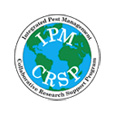
Integrated Pest Management (IPM)
Sub-Sector:
Integrated Pest Management
Status: Current
|
Start – End Date:
1993 – Present

Regions:
Asia, Europe and Eurasia, Global, Latin America and the Caribbean, Sub-Saharan Africa, US and Canada
Related Key Topics:
Capacity Building, Climate Change, Food Security, Gender, Health and Nutrition, Innovation, Markets, Natural Resource Management, Policy, Productivity
Related CRSPs:
CRSP Related
Contact
The International Affairs Offices
526 Prices Fork Road (0378)
Virginia Tech, Blacksburg, VA 24061-0378
TEL: +1-540-231-3516;
Fax: +1-540-231-3519
ipm-dir@vt.edu
Dr. Muni Muniappan,
Program Director
rmuni@vt.edu
Dr. Amer Fayad,
Associate Program Director
afayad@vt.edu
Miriam Rich,
Director of Communications
mrich@vt.edu
It has been estimated that agricultural pests—insects, diseases, weeds, and animals—can cause crop losses of between 25 and 35 percent in the field before and during harvest and in storage. It is the goal of the Feed the Future Innovation Lab for Collaborative Research on Integrated Pest Management (Feed the Future Integrated Pest Management (IPM) Innovation Lab) to increase farmer productivity by reducing the level of these losses through integrated pest management. IPM can also reduce the use of pesticides, saving money for small farmers that would have been spent on this input. Improving the level of yields also has the potential for greater food security and increased level of income.
The IPM Innovation Lab objectives focus on expanding the awareness, application, and success of IPM technologies around the world. It seeks to: i) advance IPM science and develop IPM technologies, information and systems for sound land resource management; ii) improve IPM communication and education, and the ability of beneficial practitioners to manage knowledge, resulting in the widespread adaptation, adoption, and impact of ecologically-based IPM technologies, practices, and systems; iii) provide information and capacity building to reform and strengthen policies and local and national institutions that influence pest management; and iv) develop and integrate sustainable resource-based, local enterprises into national regional and global markets.
The IPM Innovation Lab has been working with sixteen U.S. universities, including Clemson University, Florida A&M University, Fort Valley State University, North Carolina A&T State University, Ohio State University, Oregon State University, Pennsylvania State University, University of Arizona, University of California-Davis, University of Denver, University of Florida, University of Georgia, University of Hawaii, Virginia State University, Virginia Tech (ME), and Washington State University. It is also working with the CGIAR centers of the International Institute for Tropical Agriculture (IITA), International Center for Agricultural Research in the Dry Area (ICARDA), the International Potato Center (CIP), the International Rice Research Institute (IRRI), and the International Crops Research Institute for the Semi-Arid Tropics (ICRISAT).
During this phase the IPM Innovation Lab has been active in seventeen countries in Sub-Saharan Africa, Central America, and South Asia: Bangladesh, Cambodia, Ecuador, Ethiopia, Ghana, Guatemala, Honduras, India, Indonesia, Kenya, Mali, Nepal, Philippines, Senegal,Tajikistan, Tanzania, and Uganda. Of these, thirteen (75 percent) are currently among the USG Feed the Future priority countries.
